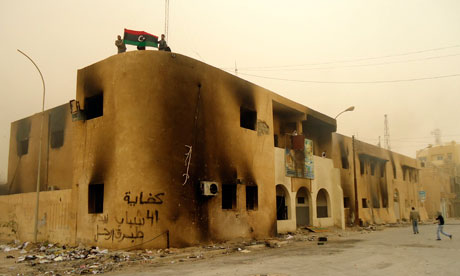Libya threatens to treat western journalists as 'outlaws'
Warning made as reporters enter Libya through eastern border with Egypt as Muammar Gaddafi loses grip on country

Journalists from the BBC, CNN and other western media who have entered Libya will be "considered outlaws", the country's deputy foreign minister warned on Wednesday.
Khalid Kayem said that the influx of reporters who have streamed across Libya's border with Egypt in the past 24 hours are there "illegally and will be considered outlaws", according to the news agency AFP.
Journalists from across the world have been entering Libya through its eastern border with Egypt over the past day, as Muammar Gaddafi loses his grip on that part of the country.
Martin Chulov, a Guardian foreign correspondent, is thought to have been the first foreign journalist to report from Benghazi, the country's second-largest city, on Wednesday. The Guardian is part of the group that also publishes MediaGuardian.co.uk.
The BBC's Jon Leyne arrived in eastern Libya late on Tuesday and is understood to be heading towards Benghazi, where many international journalists are now based.
Reporters from US broadcasters CNN and NPR also crossed Libya's border with Egypt late on Tuesday. Lourdes Garcia-Navarro, an NPR reporter, described Libyans in the east as "very excited to see western journalists".
ITN, which produces ITV News and Channel 4 News, deployed a small group of journalists to Libya's eastern border yesterday. Two other ITN reporters entered Libya through its western border with Tunisia earlier today.
However, the Libyan capital, Tripoli, remains inaccessible for foreign journalists as government militiamen clamp down on dissenters.
Jon Williams, the BBC's world news editor, told the Guardian: "Around Tripoli it is still as menacing and arguably more so now than it has ever been."
Williams said it was becoming increasingly difficult to describe Libya as one country. "The eastern province is really like it's not Libya," he told the Guardian, likening the situation to Iraq's self-ruled northern region under Saddam Hussein.
"There is a danger of exaggerating the danger of where they are in [eastern] Libya. But around Tripoli it is still as menacing and arguably more so now than it has ever been," he added.
An ITN spokeswoman said: "ITN has experienced teams deployed across the region to provide comprehensive coverage for ITV News and Channel 4 News viewers. We will not be giving out further details as the safety of our personnel is our first priority."
Large groups of Libya's Egyptian and Tunisian citizens were reported to be crossing the borders back into their native countries, passing international media moving in the opposite direction.
Talking on state TV on Tuesday, Gaddafi left many foreign nationals fearing for their security as he described anti-government protesters as "rats and mercenaries" and vowed to "cleanse Libya house by house" until they surrendered.
• To contact the MediaGuardian news desk email editor@mediaguardian.co.uk or phone 020 3353 3857. For all other inquiries please call the main Guardian switchboard on 020 3353 2000.
• If you are writing a comment for publication, please mark clearly "for publication".
No comments:
Post a Comment